Various religious practices in Hartland are known to have existed since its early settlement. Although formal churches wouldn’t be built for a few decades, many people gathered to practice their respective beliefs at home or various venues throughout the area.
*
The Commonwealth of Massachusetts had several requirements regarding settlement in their territories which included the Province of Maine. Among these were reservations of land lots for specific uses as noted in the 1799 Land Deed for Hartland to Dr. John Warren.
“Excepting and reserving however, four lots of three hundred and twenty acres each for the following uses viz; One lot for the first settled minister his Heirs or assigns – One lot for the use of the ministry – One lot for the use of schools, and One lot for the future disposition of the General Court. The said lots to average in situation and quality with the other lands in said Township.”
These ministry lots were intended for the Congressional Church but that did not stop numerous other denominations from practicing their own beliefs either at home or in organized religious gatherings. Some of the known denominations which existed at some point in Hartland’s history are noted below.
*
Names of Pastors & Ministers for several of the early larger denominations are included in the Maine State Yearbook & Legislative Manuals.
*
Comeouters
The “Comeouters”, also known as “New Lights”, were a Christian splinter group formed around 1840 who had “recently come out of the various religious denominations with which they were connected; hence the name. They were against anti-Christian bigotry and some were involved the early anti-slavery movement.”
Although details specific to a Hartland based group have yet to be found, there are records of them throughout other parts of Maine including Athens. It is presumed they assembled here at some point because of a local landmark in Canaan known as “Comeouter Hill” which was once part of Hartland until 1849. It is located about a 1/2 mile south of Morrill Pond near the current Hartland-Canaan town line.
*
First Baptist
The First Baptists had long been practicing in Hartland but their first dedicated Church was built in 1842 by Sherman Stone of Ripley. For a time it combined with St Albans Village Church however disagreements among its paired followers arose and there was a split. On October 27, 1847 a meeting was called and it formally organized as Hartland First Baptist Church.
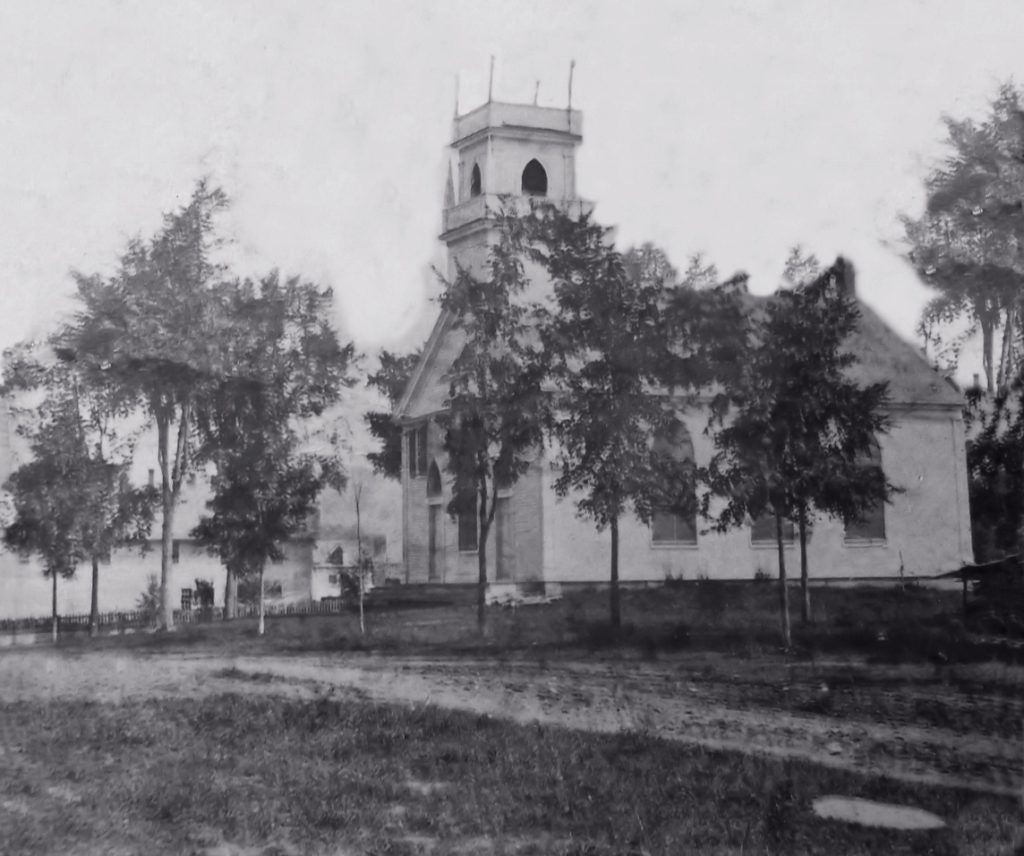
Hartland First Baptist Church – c1877
*
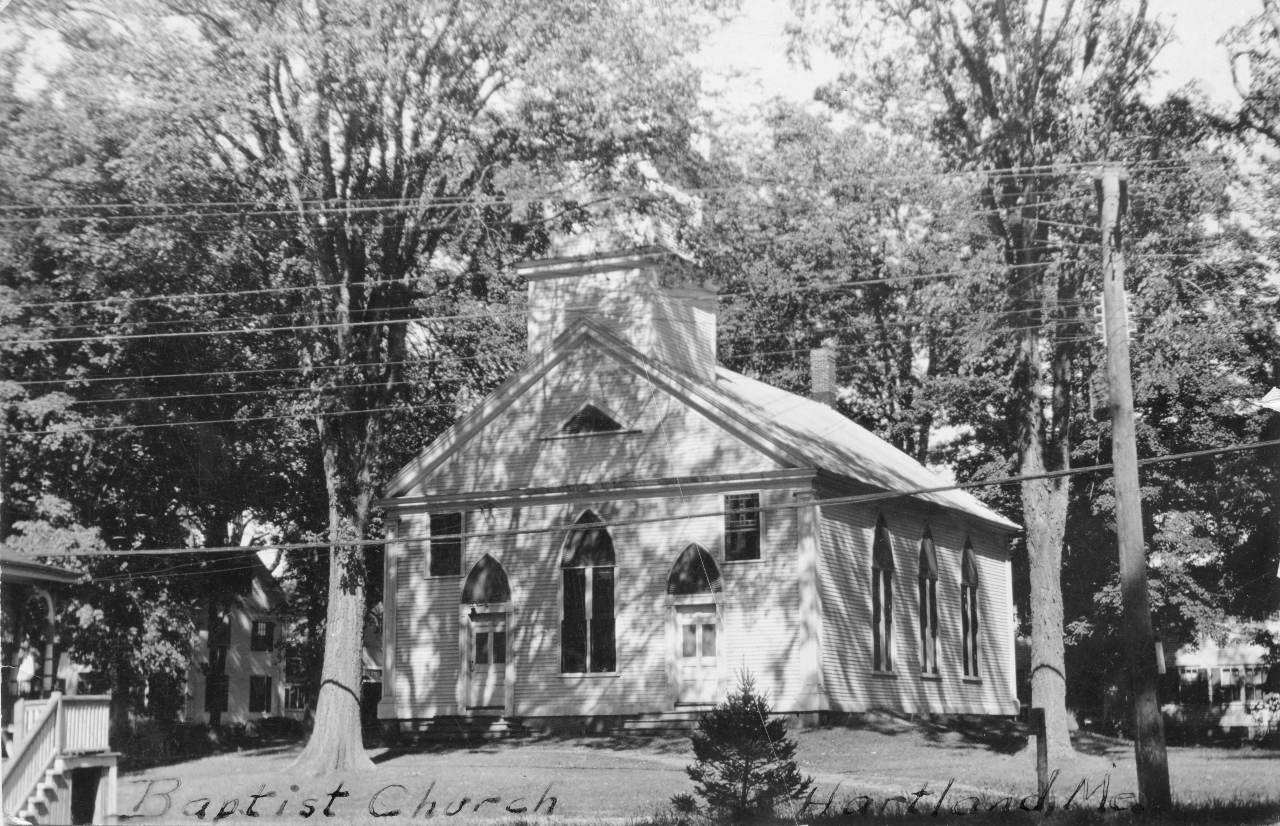
Hartland First Baptist Church
*
In 1942, the congregation celebrated the 100th Anniversary of its building as noted in this newspaper article.
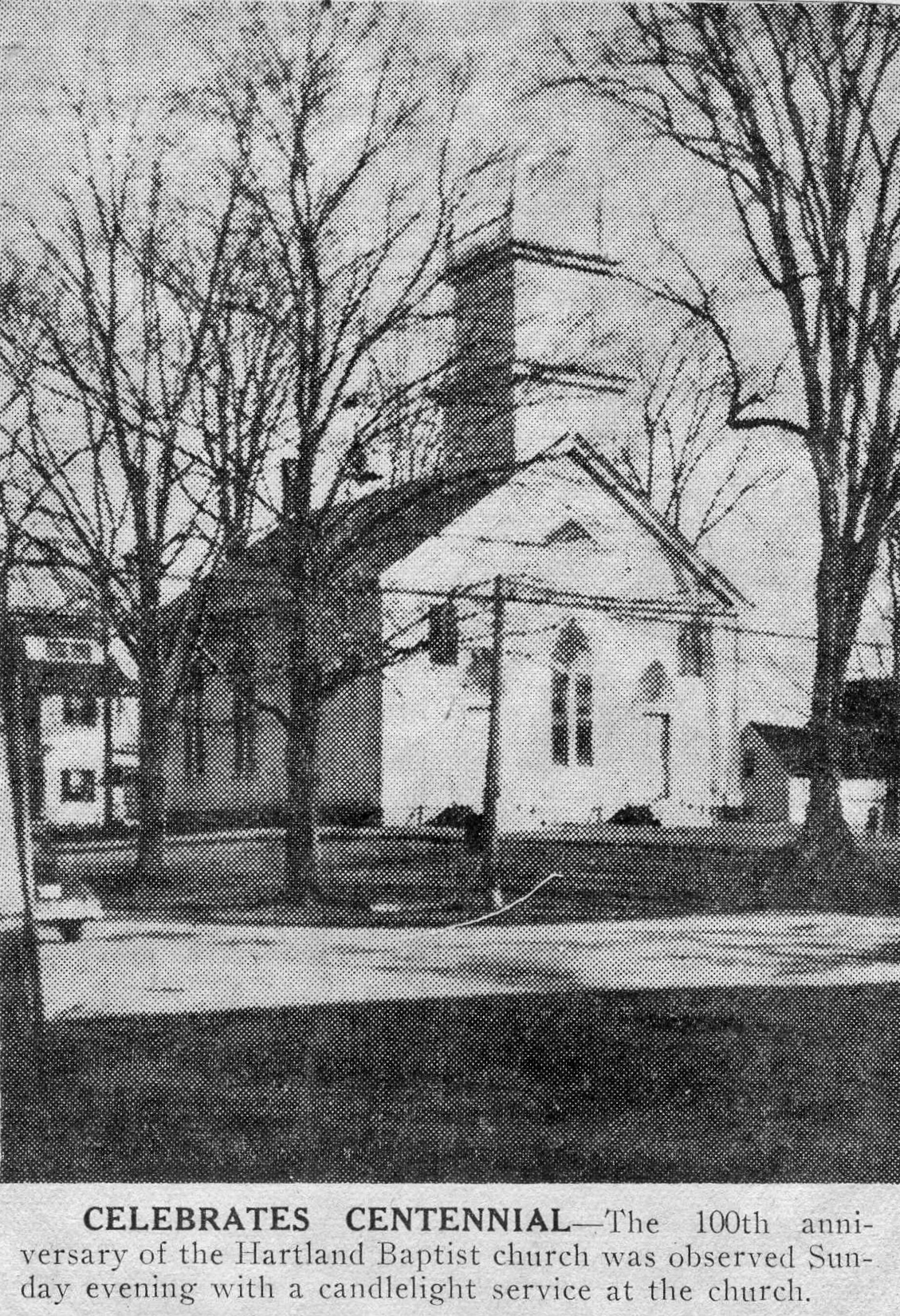
Hartland Baptist Church Centennial Celebration – 1942
*
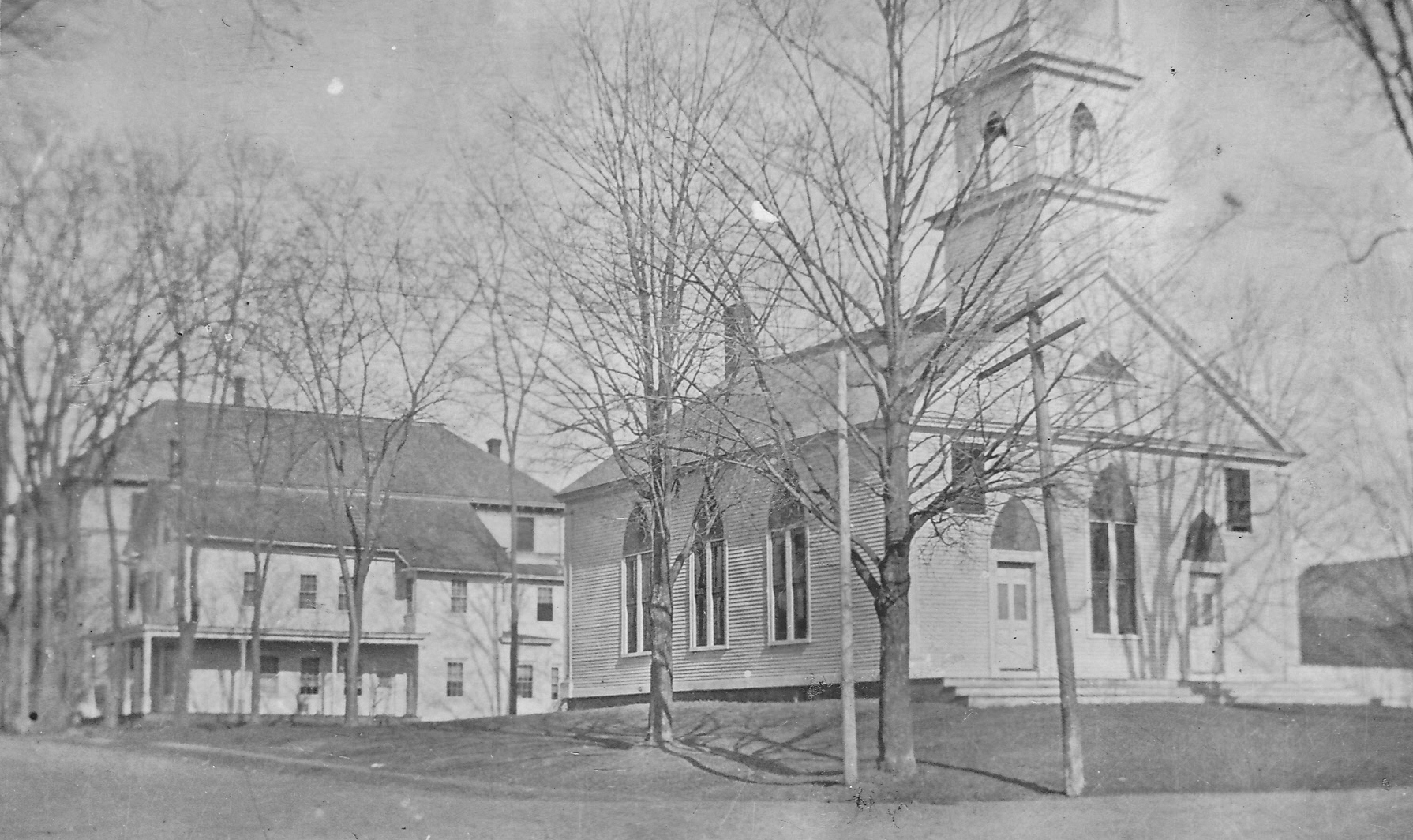
Hartland First Baptist Church
*
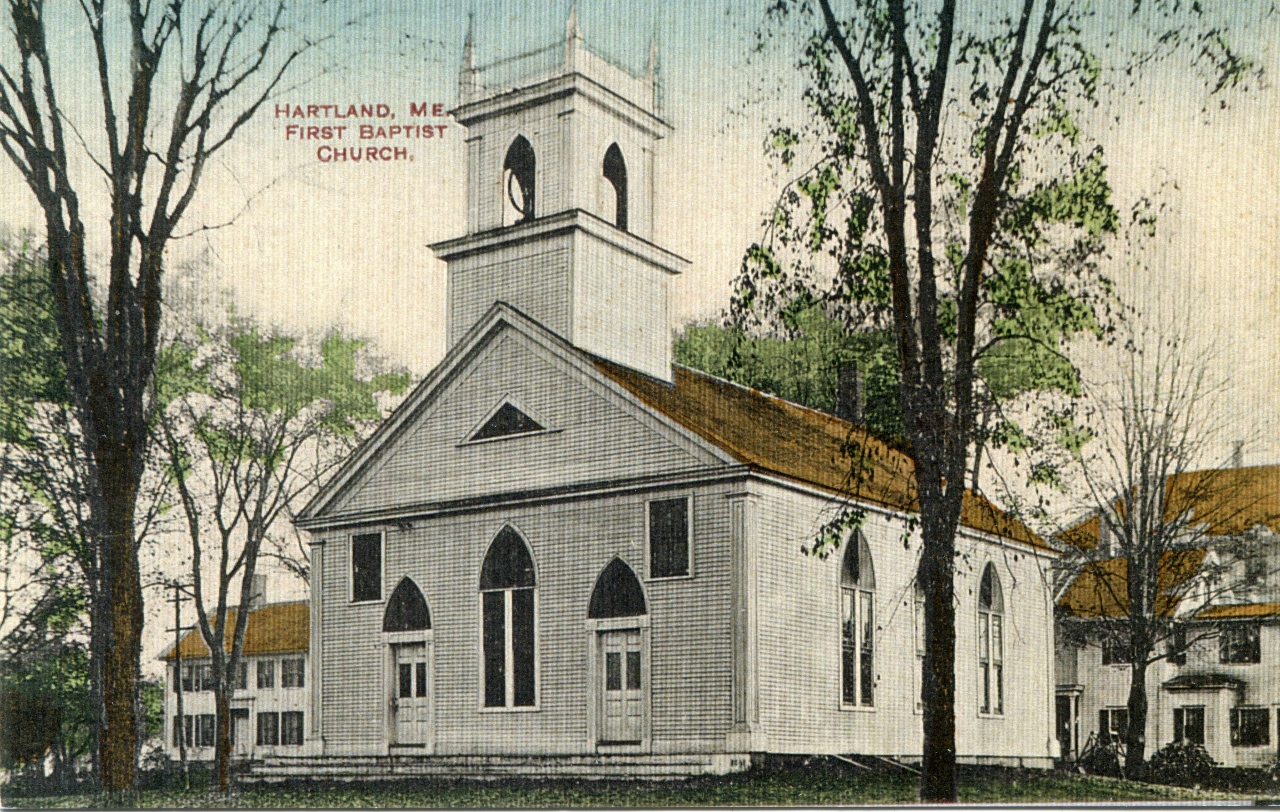
Hartland First Baptist Church
*
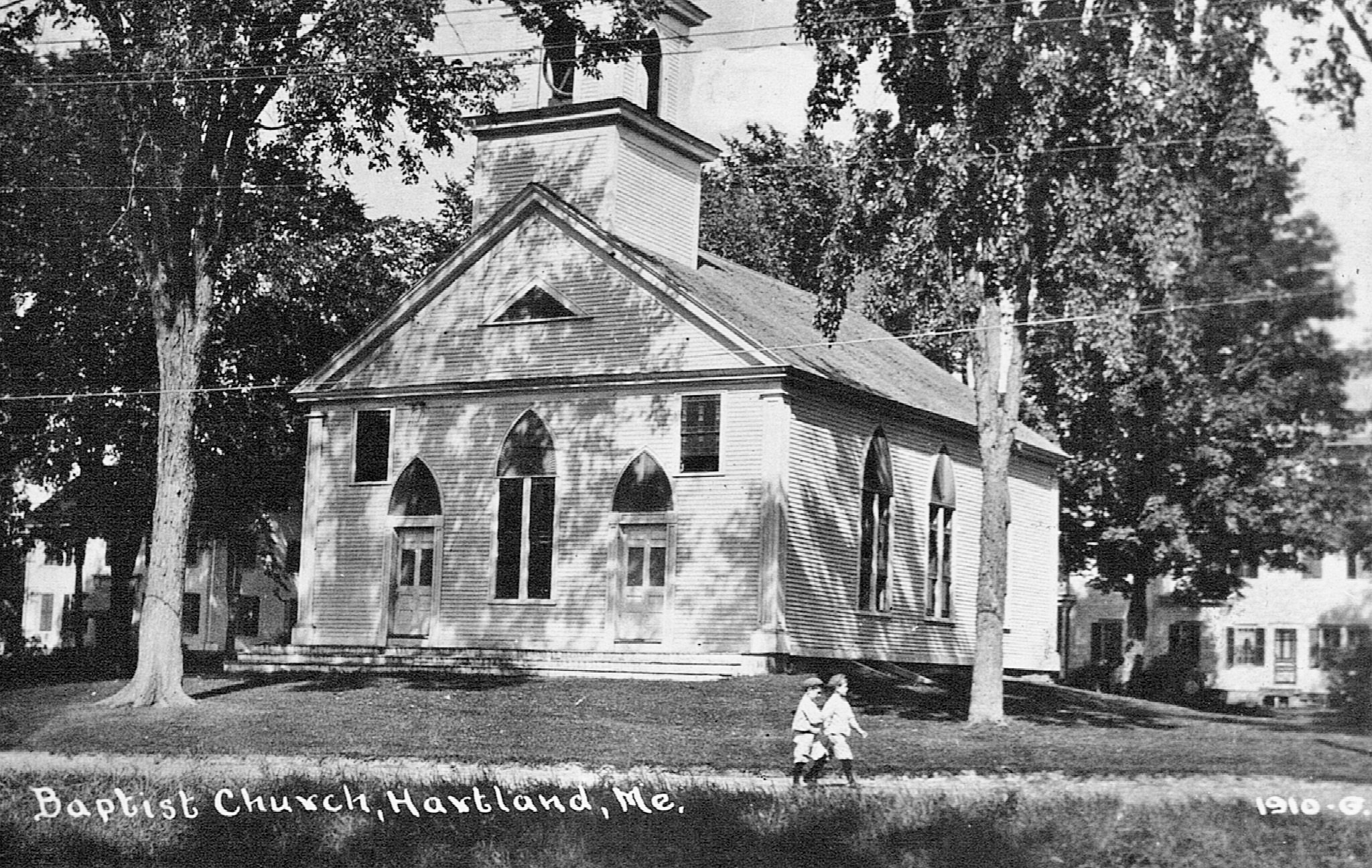
Hartland First Baptist Church
*
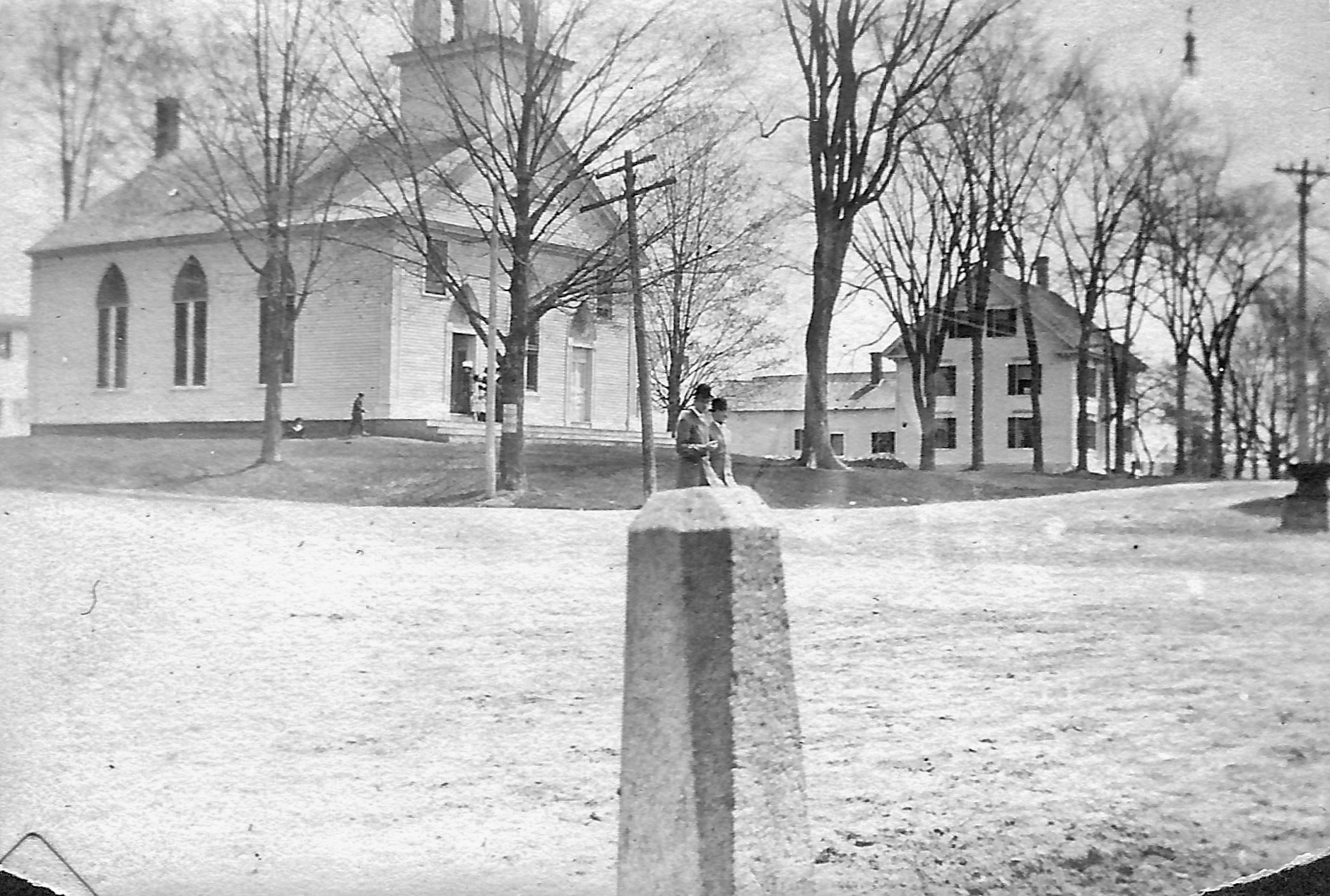
Hartland First Baptist Church seen with original James Fuller, Jr Residence
*
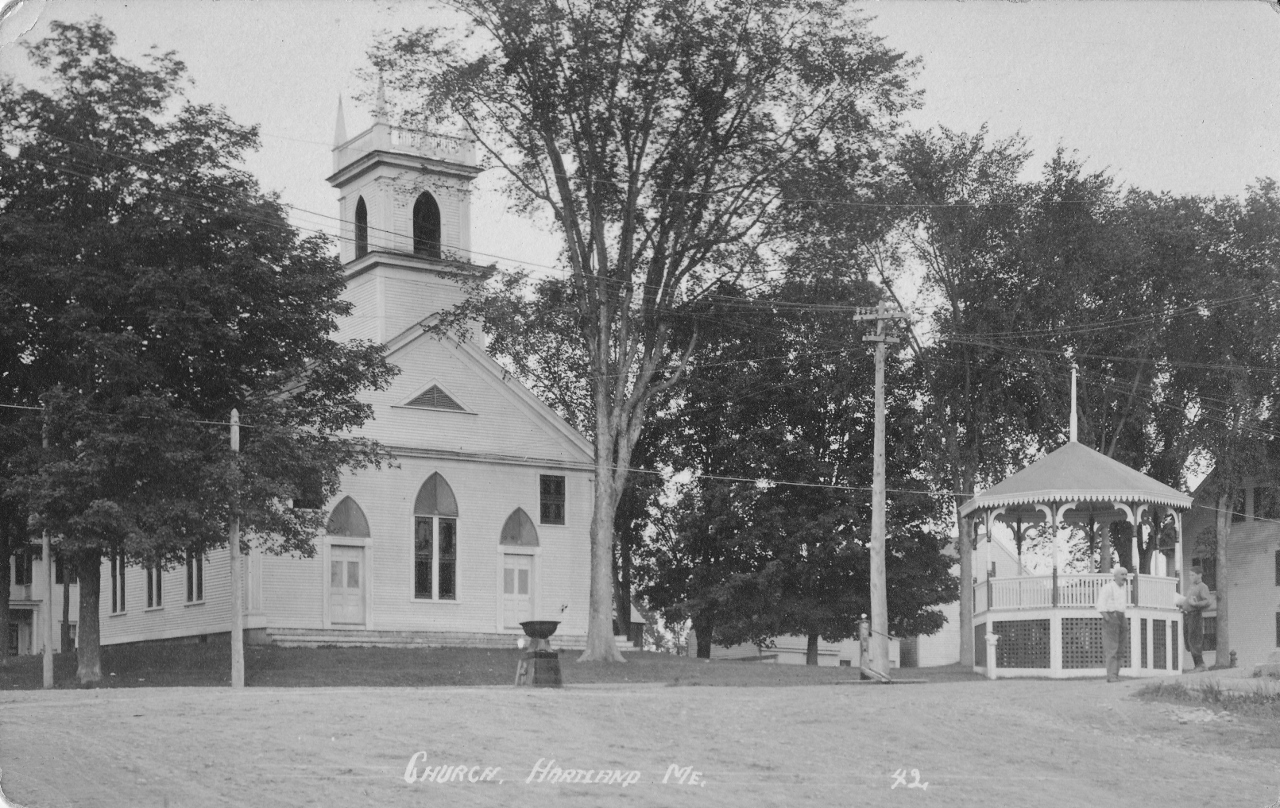
Hartland First Baptist Church
*
The church later purchased the original James Fuller, Jr Elm Street residence and converted it into a parsonage. Their first parsonage had previously been located further down Elm Street.
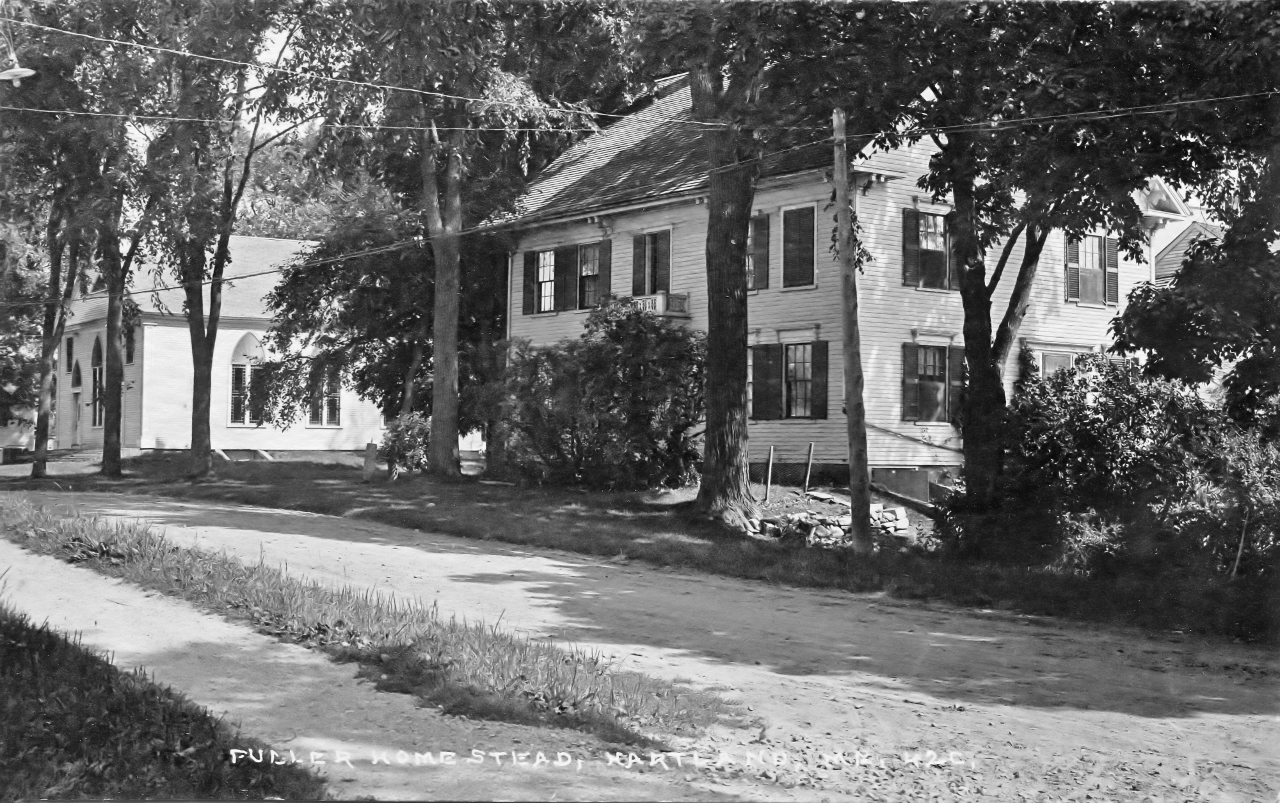
Former James Fuller, Jr Residence on Elm Street
*
In 1980, the church established the Hartland Christian School with their own state accredited program, teachers and facilities including a new gymnasium and several classrooms.
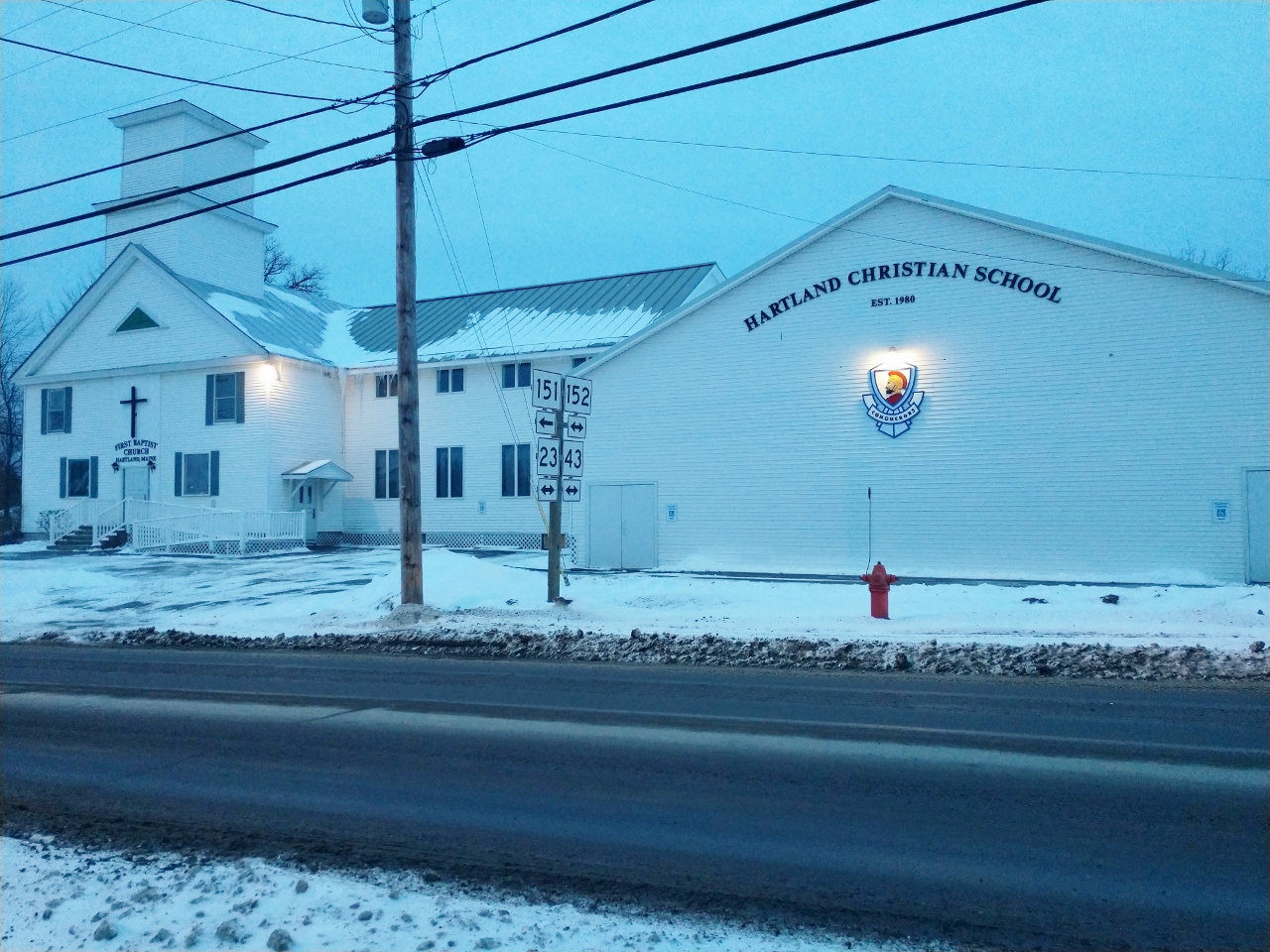
Hartland First Baptist Church with Hartland Christian School Gymnasium
*
Church of God
Hartland resident Silas Pennell led this group. As noted in the 1912 Somerset County Registry, “Silas was a well-known minister of the denomination known as the Church of God and organized the first church of the denomination in the State of Maine at the Gale Schoolhouse in Palmyra in September of 1873.”
*
Free Baptist
Free Baptists officially organized in Hartland on February 25, 1868 with 13 original members selecting Augustus Thomas Bowman (1823-1880) as their first Pastor. Reverend Bowman had arrived in Hartland with his family from Somerset Mills (Fairfield) around 1865 living on Commercial Street at the former Peleg Haskell residence. Reverend Bowman was known for performing Baptisms behind his residence at the Mill Pond Lagoon off Water Street. He is interred with his wife at Ireland Cemetery.
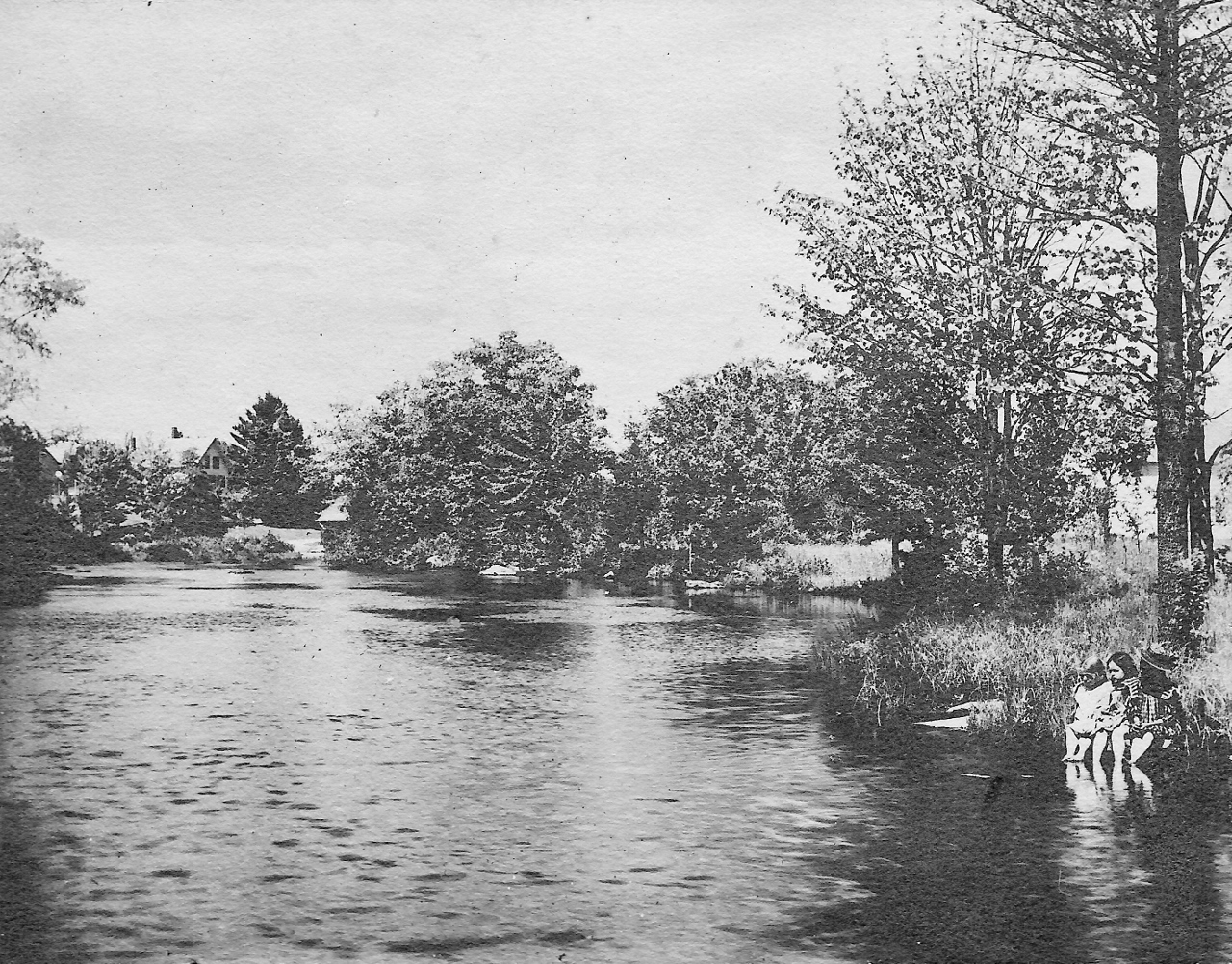
Mill Pond Lagoon
*
Free Baptists also held Baptism Rituals on the shores of Great Moose Lake.
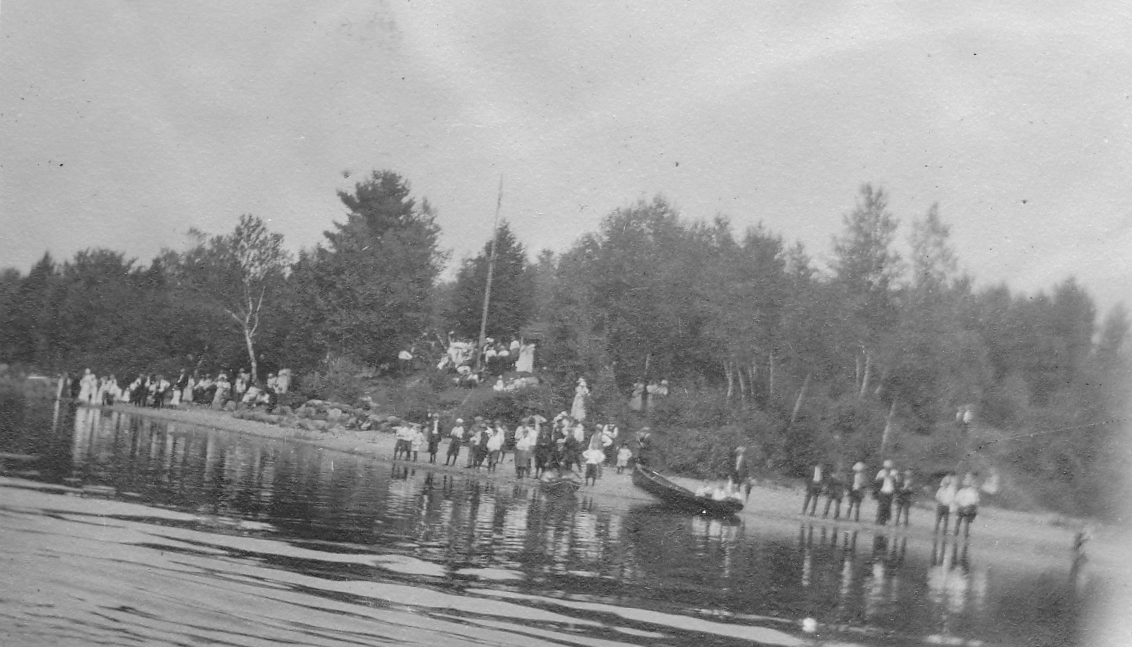
Free Baptist Baptism on Great Moose Lake – 1910
*
Chautauqua
Although they were not based in Hartland, journal notes by local resident Fred Haseltine from 1917-1919 indicate traveling Chautauqua Assemblies made several stops in Hartland at the Opera House. Chautauqua was an adult education and social movement popular in the late 19th and early 20th centuries. It was organized in 1874 by Methodist Minister John Heyl Vincent and businessman Lewis Miller at a campsite on the shores of Chautauqua Lake in Upstate New York. Chautauqua Assemblies expanded and spread throughout rural America until the mid-1920s. The Chautauqua brought entertainment and culture to communities with Speakers, Teachers, Musicians, Showmen and Preachers.
*
Methodist
Methodists had been practicing their beliefs for decades in Hartland before the present Methodist Episcopal Church formally organized in 1871 and held services at Central Hall and other venues in town before they had a dedicated building. In 1883, work began on a new church on Commercial Street led by the efforts and financial support of Mrs. Grace (Wilson) Linn, wife of Archibald Linn. It cost $2,800 to build and was erected by Hartland resident Amasa James Moor using lumber from his sawmill at the Upper Dam.
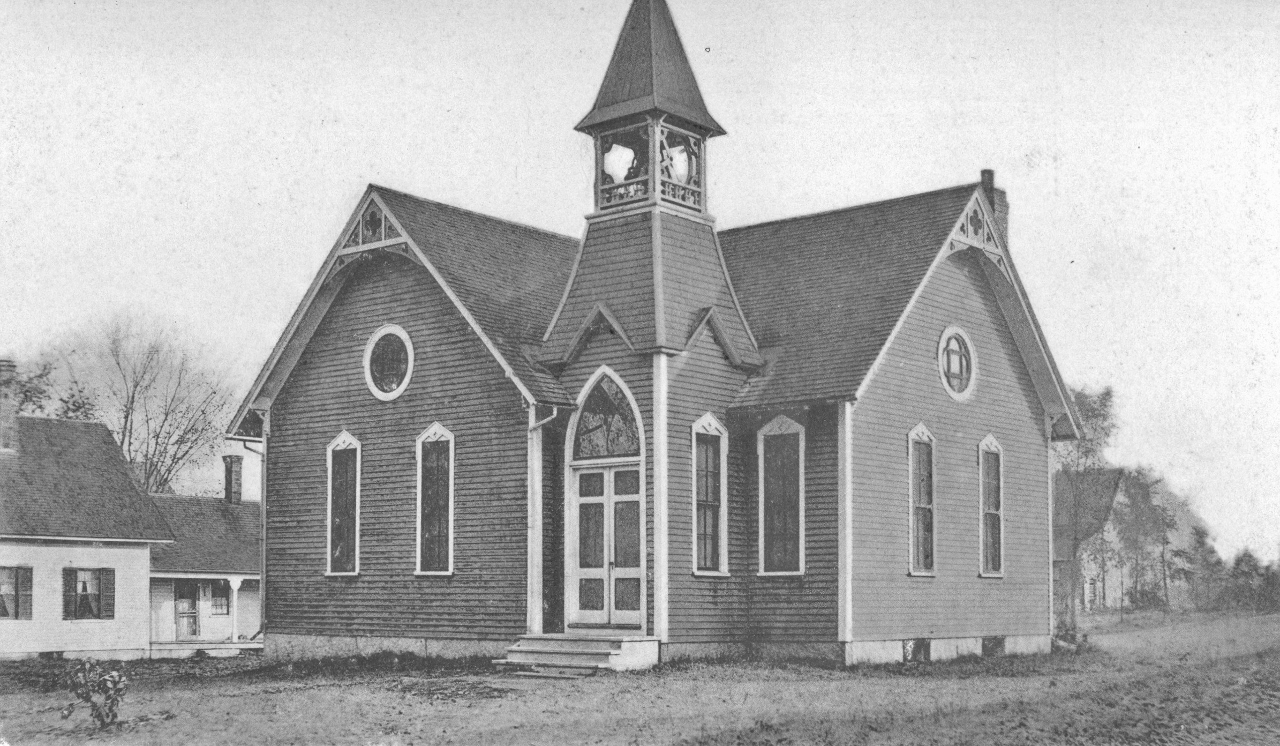
Grace Linn Memorial Methodist Church
*
Just after the new church opened, Mrs. Linn unfortunately passed away on January 26, 1884. Her funeral was the first memorial service held in the new church she worked diligently to have built. On March 26, 1884, the church was officially dedicated in her memory as the Grace Linn Memorial Methodist Episcopal Church.
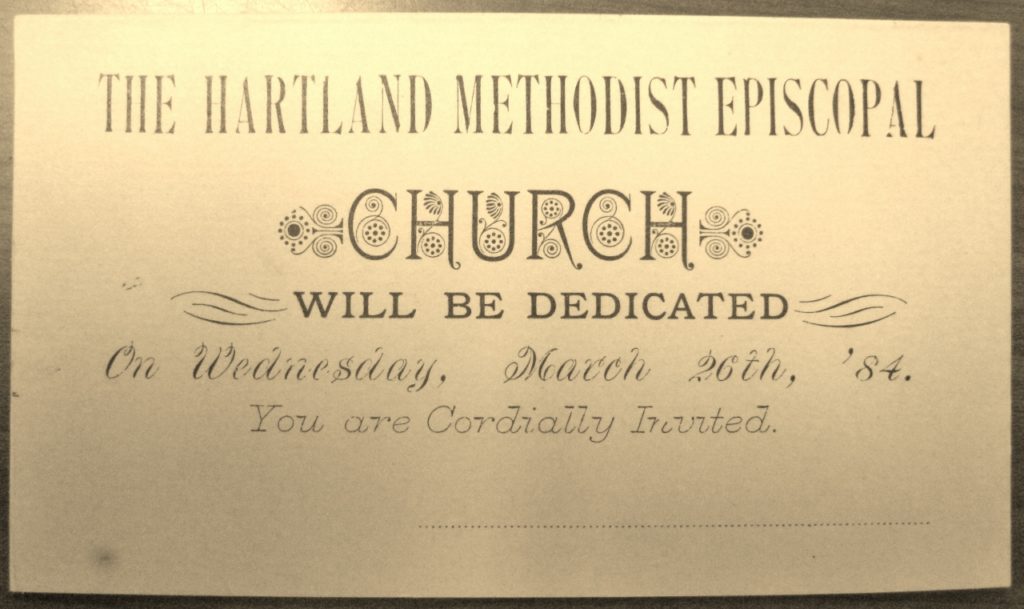
Original Invitation sent to Albion K. Libby (Photo courtesy of Wayne Libby)
*
The Methodist Church Ladies Aide was created on April 13, 1887. Among their many activities was supplying meals at the annual Town Meetings.
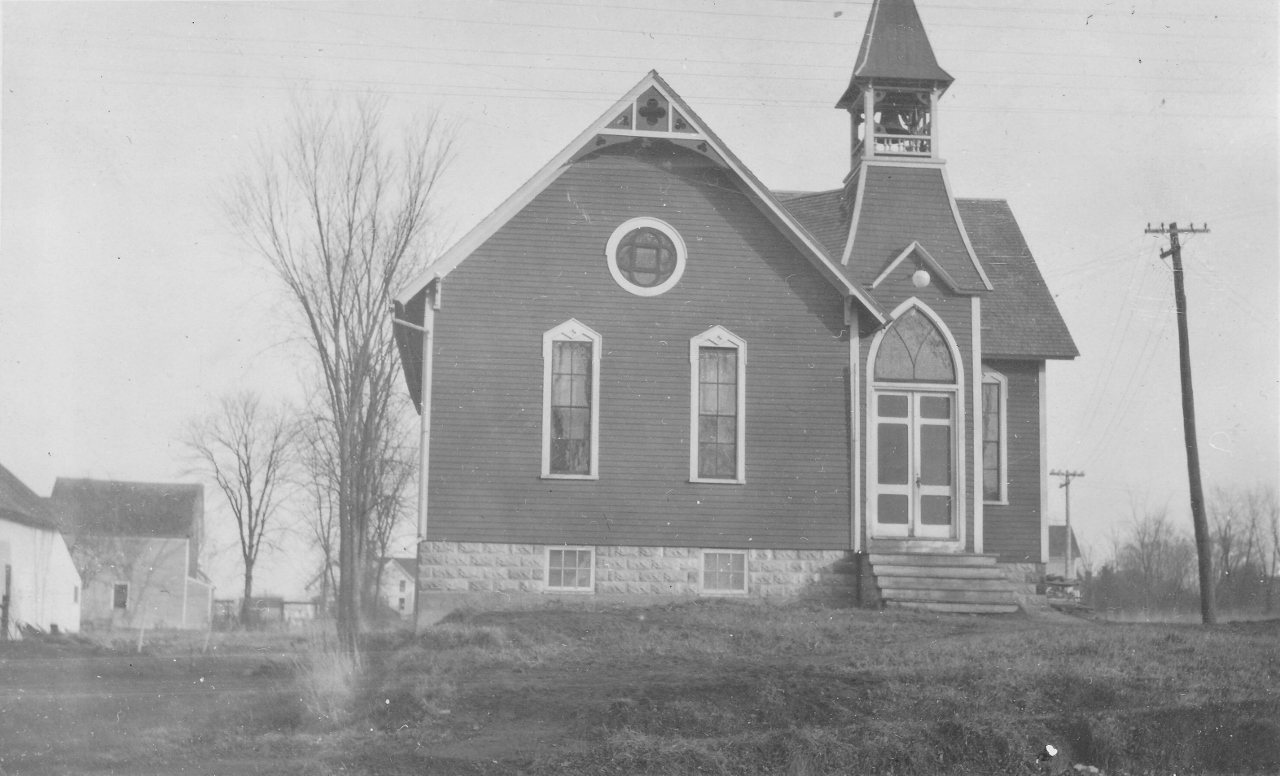
Grace Linn Memorial Methodist Church
*
In 1896, the church purchased property on the newly developing Blake Street from Calvin Blake, Jr and built a dedicated parsonage.
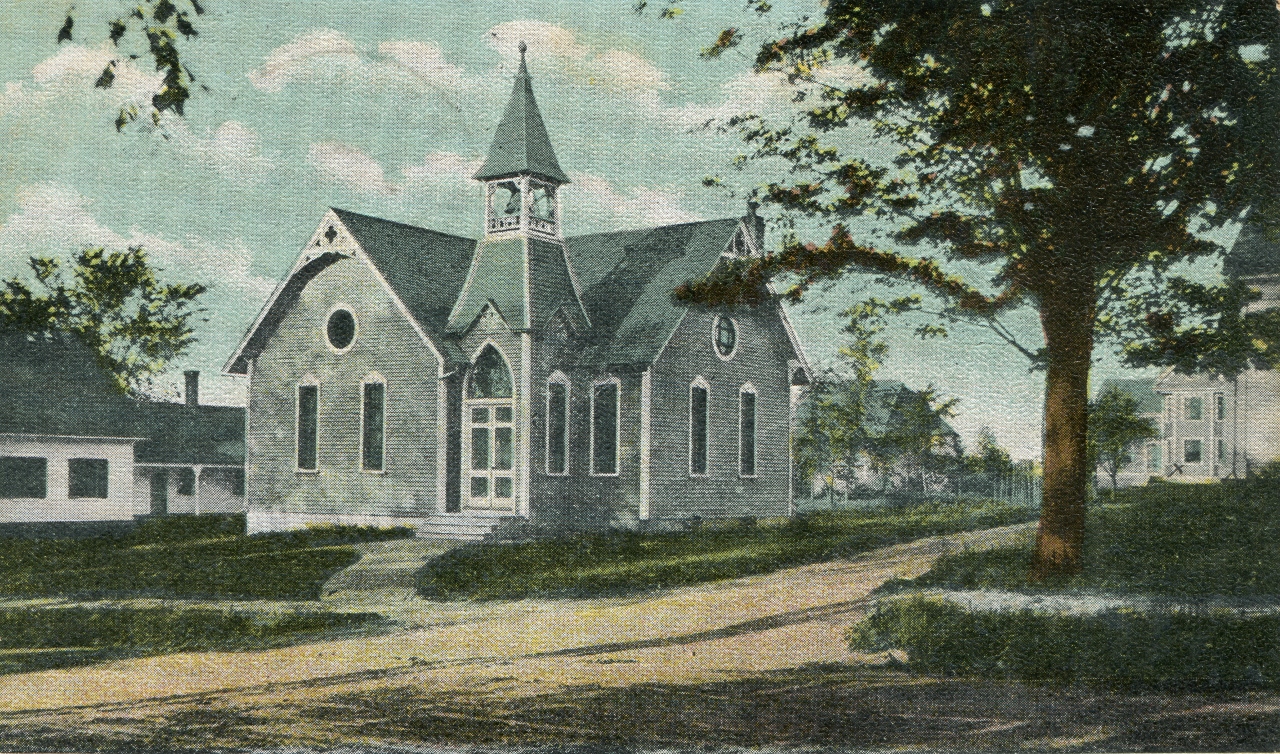
Grace Linn Memorial Methodist Church
*
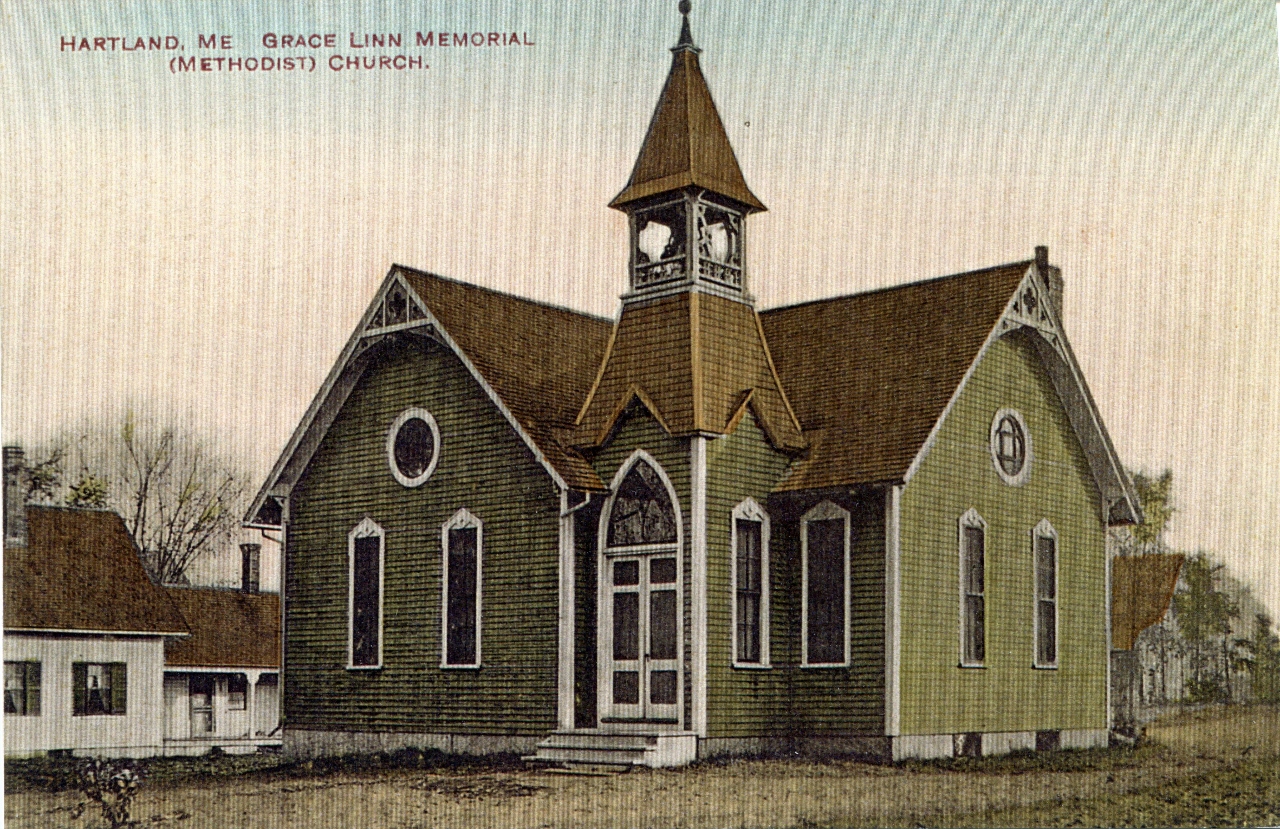
Grace Linn Memorial Methodist Church
*
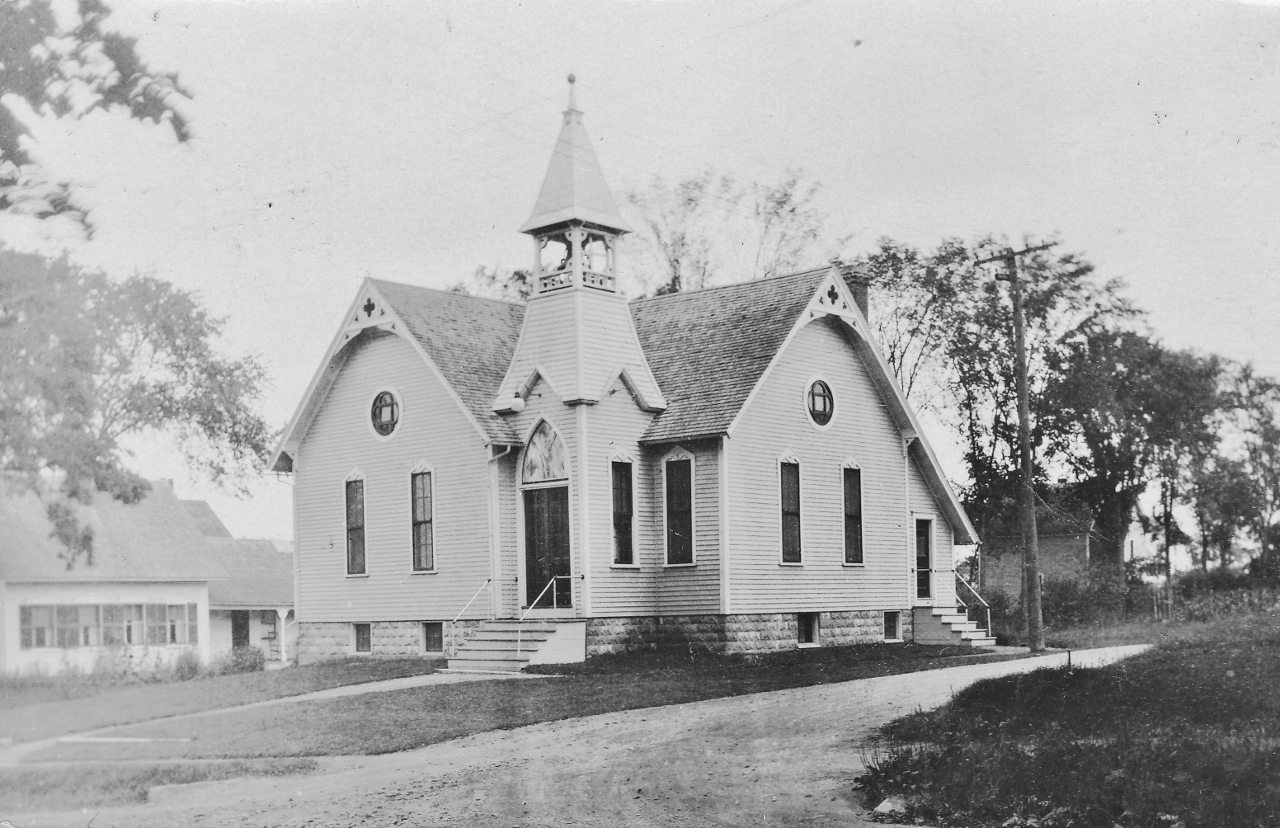
Grace Linn Memorial Methodist Church
*
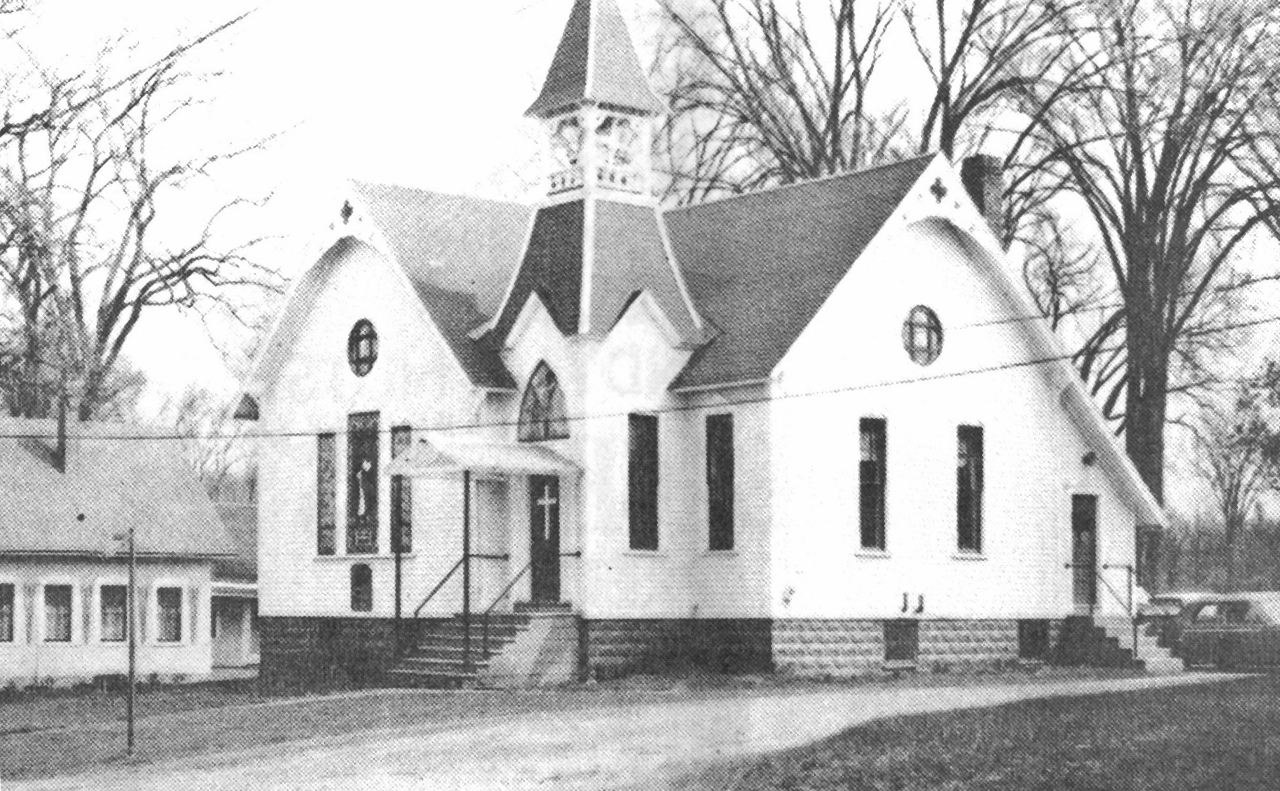
Grace Linn Memorial Methodist Church
*
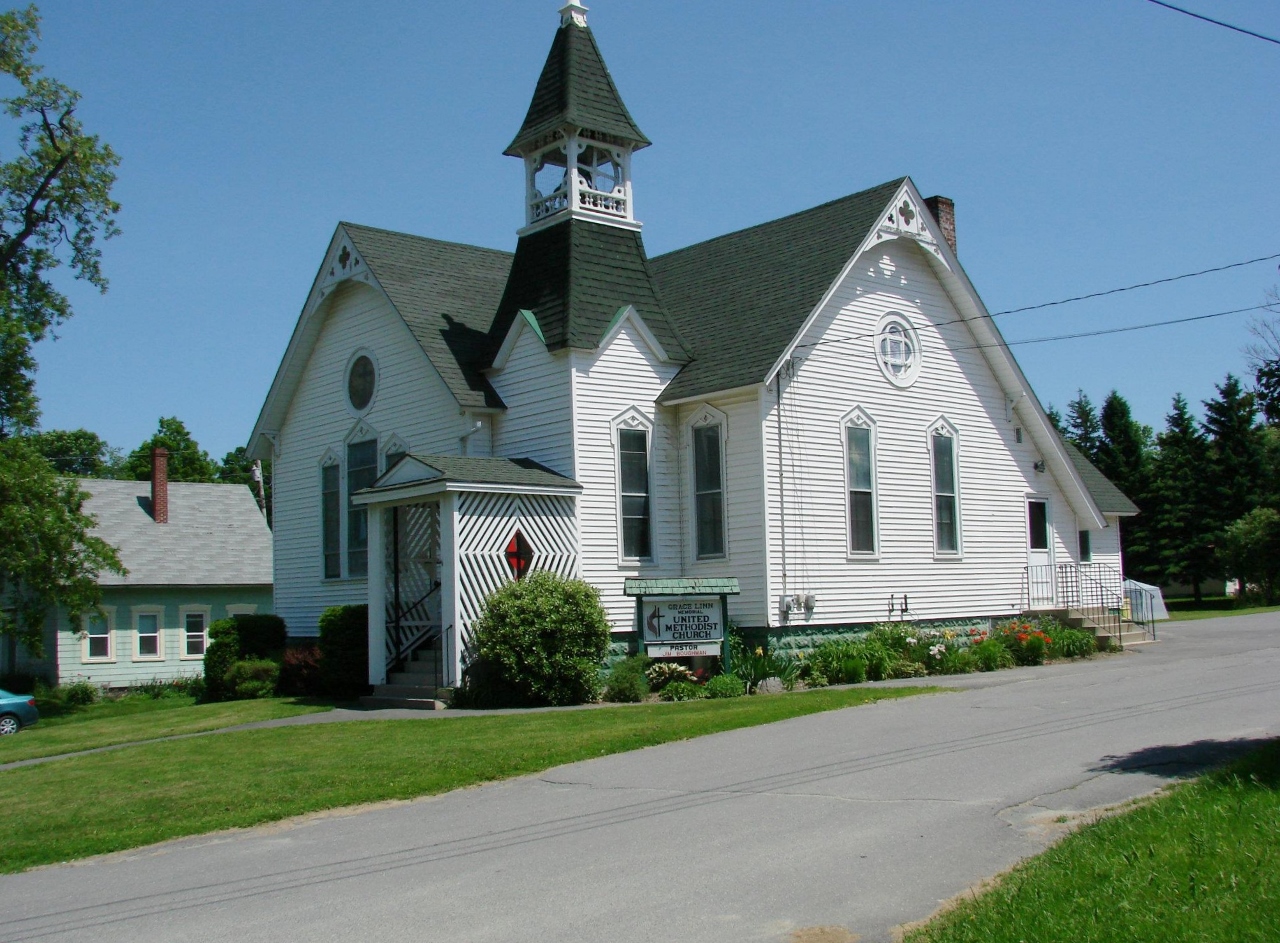
Grace Linn Memorial United Methodist Church
*
Christian Band (aka Universalists)
As noted in the 1912 Somerset County Register, “Grove Meetings are also held on the east shore of Morrill Pond in West Hartland under the auspices of an organization known as the Christian Band. Reverend J. Dysart is President and one of the principal speakers. Reverend Ora Chase, Greenfield H. Bowie, Richard Chase and George Curry are other preachers. Meetings are held the first and third Sundays during the summer. From 200 to 300 people is the usual attendance.” Greenfield H. Bowie resided in West Hartland for several years.
“Reverend Greenfield Harrison Bowie of Hartland, Maine passed through the draperies into God’s great ‘Other Room’ on September 10, 1921. He began his life work with the Methodists, was with the Free Baptists for a time, but finally found his true home with the Universalist people. The very human and the spirit, like balanced feet, carried him into much good service for his Master. He taught over eighty terms of school, preaching in schoolhouses frequently, but the outstanding fact of his life is the score of years that he put in among the lumber camps of Northern Maine. He was very unselfish, and nursed the sick gratis, regardless of creed or race. Late in life he made several violins, and for years he could be seen traveling from camp to camp with his violin and Bible. Often on tote teams, and more often on snowshoes, he literally gave his strength to the lumberjacks and thousands of them testify to his helpfulness. This was without financial compensation, save impulsive gifts from these men of the woods. In his latter years he had built in the grove on his farm a place in which to conduct outdoor services. Here he delighted to gather his neighbors and friends and to declare to them in his original and forceful way the great fundamentals of our faith. He asked for little in life and gave much. He was modest and very lovable, and all he wanted was a chance to serve.”
*
Pentecostal
In 1960, the Central Maine Home Missions Board purchased a small building on lower Elm Street located at the Hartland-Palmyra town line. The first level was devoted to the Church Sanctuary & Sunday School Classrooms with a small parsonage on the second floor. In 1968, Pastor Ronald C. Parker was ordained and the Church was incorporated as the Hartland Full Gospel Church.
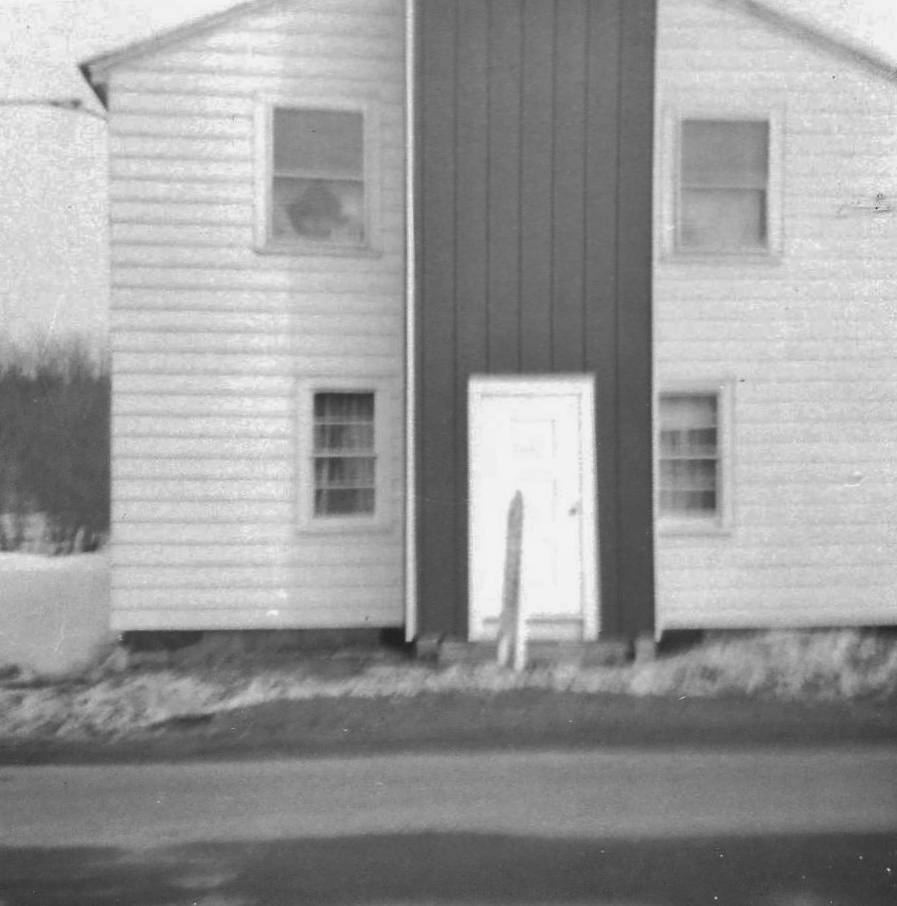
Original Hartland Full Gospel Church
*
In the early 1970s, a new Full Gospel Church was built behind the original location set back from Elm Street. Portions of the former Methodist Church in Guilford, which had recently been torn down, were recycled and used in the new building. The new Church featured a 6 room parsonage. Eight additional Sunday School rooms were added in 1984 and in 1990 a gymnasium was added.
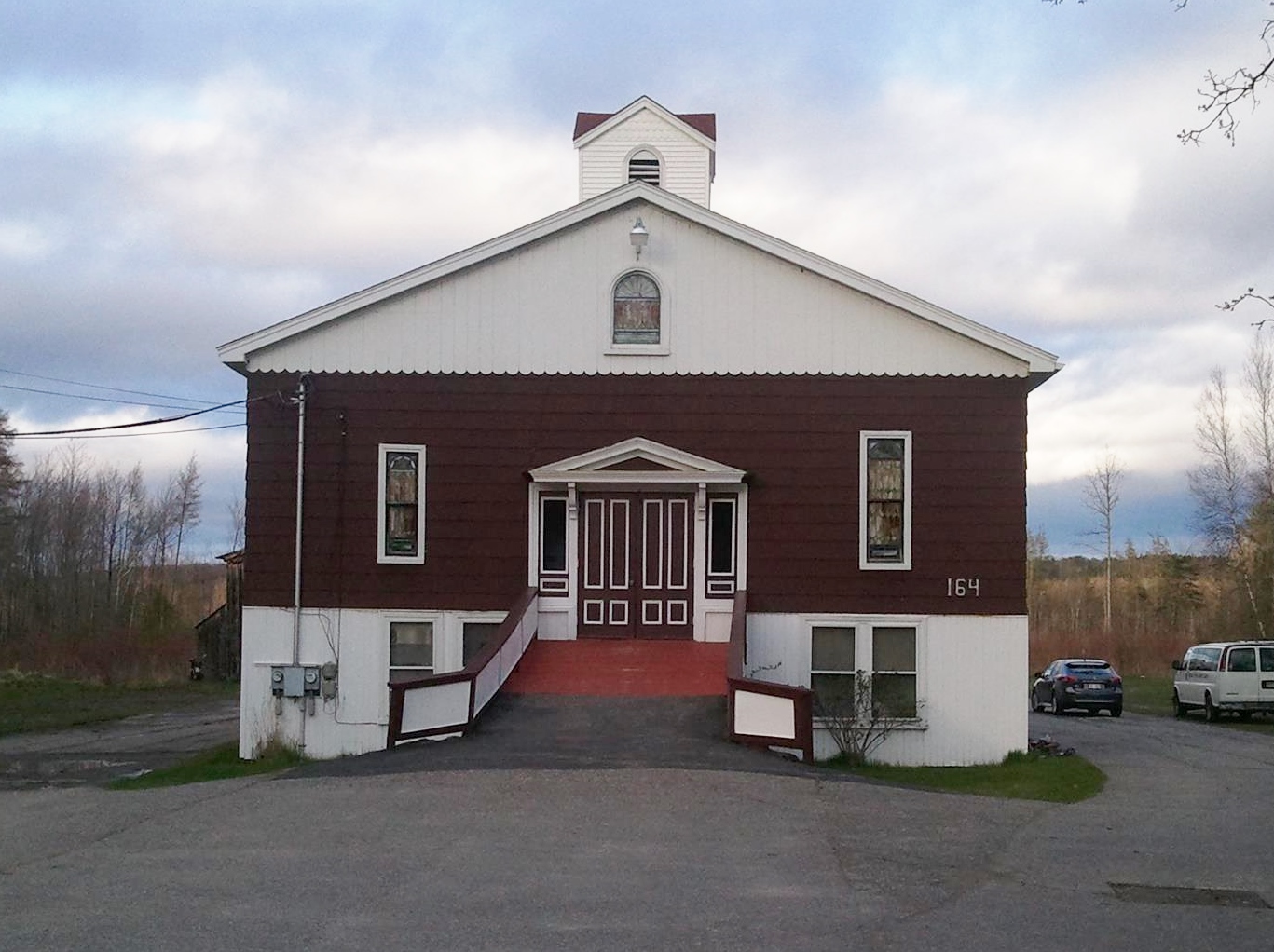
New Hartland Full Gospel Church